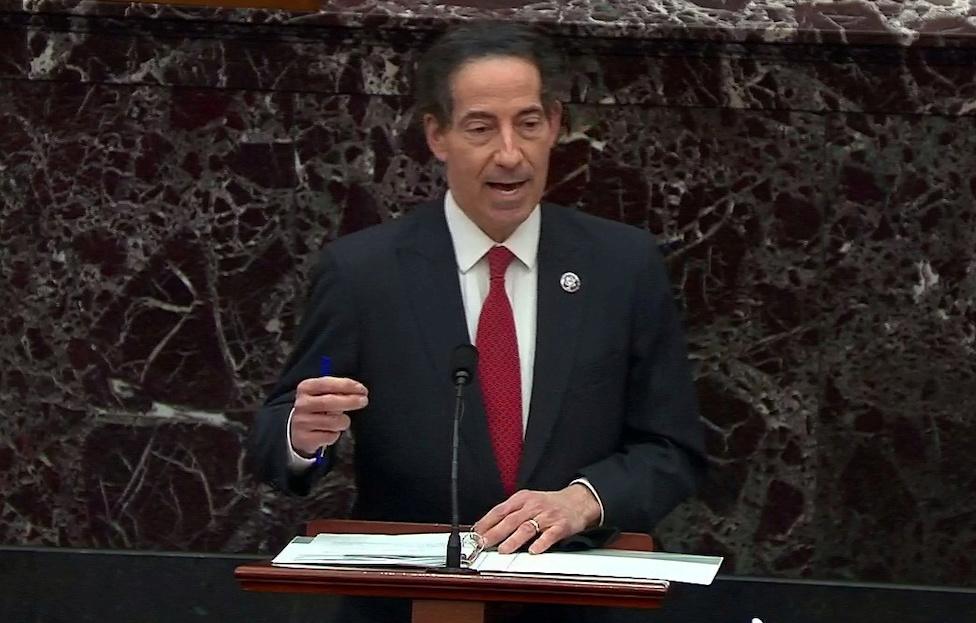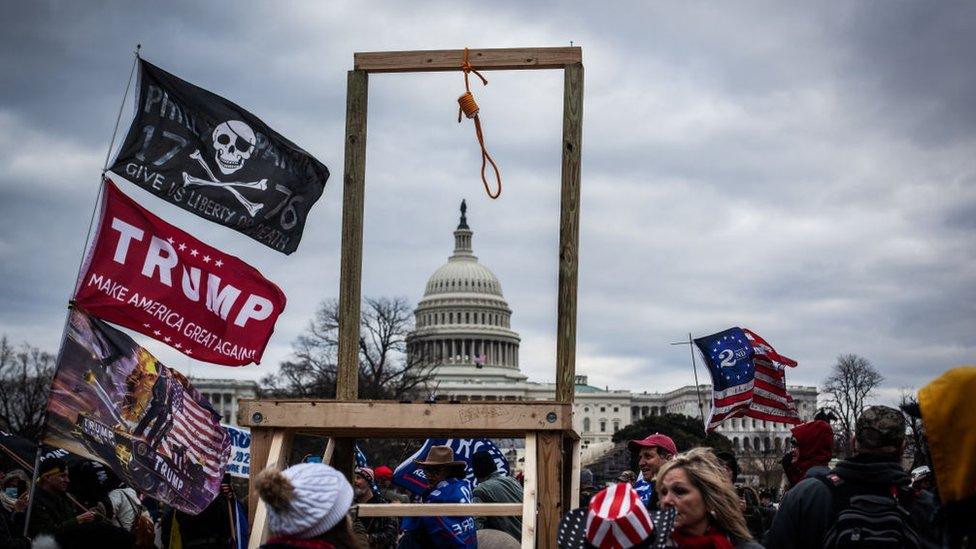Trump impeachment: Key takeaways from second day of Senate trial
- Published
Watch dramatic new footage of police under attack at the Capitol riot
On day two of Donald Trump's Senate trial, the prosecutors had the spotlight to themselves.
The House impeachment managers presented new video footage as evidence of the brutality of what happened during the Capitol riots.
But Democrats made Donald Trump's Senate trial about more than just the events in Washington on 6 January.
They prosecuted a case against the president's conduct - in tweets and speeches - before, during and after election night 2020.
Here are some of the key takeaways.
'There was method to that madness'
Lead manager Jamie Raskin quickly picked up where he left off on Tuesday, using Trump's own words on the day of the Capitol insurrection to tie him to the unrest.
Trump was no "innocent bystander" on 6 January, he said, he was the "inciter-in-chief". Over many months, Trump had "praised, encouraged and cultivated violence".

The Democratic congressman said Trump's "remember this day forever" tweet while the Capitol was being ransacked were not words of sadness, but of celebration. Accusing the former president of watching the chaos unfold on TV "like a reality show", he went on to say: "This is a day that will live in disgrace in American history, unless you ask Donald Trump."
And if the Senate doesn't convict Trump and prohibit him from holding office in the future, Raskin concluded, such violence will happen again.
From here, the managers laid out the details of their case, including more videos and accounts. But Raskin set the stage.
A full-bore attack on Trump's election claims
The Democrats want the senators to pass judgement on whether a president can call into question American electoral processes the way Trump did.
Such actions, Congressman Joaquin Castro said in his presentation, are dangerous to a democracy.
This is going to put Trump's legal team in a delicate situation.
The terror of being trapped in the US Capitol - three eyewitness accounts of politicians
They have reportedly advised the former president that his best defence is to focus on the constitutionality of the trial and his freedom of speech, not to rehash arguments that the election was fixed. But the Democrats are using their time in front of the Senate to launch a full-bore attack against the president's claims. He may demand that his team have a response.
The move also may not sit well with some of the Republican senators - like Josh Hawley of Missouri and Ted Cruz of Texas - who vocally supported Trump's election fraud claims. The Democrats were never going to win their support for conviction, but they might make them uneasy in their seats.
Will it change any Republican minds?
Senator Hawley certainly didn't want to give the impression of feeling uncomfortable - he sat with his feet on a chair in the chamber's second-floor gallery. Meanwhile, Rand Paul of Kentucky was seen doodling on a notepad.
Those were a few of the more visible indications that, for at least some of the senators sitting in judgement of the former president, the day's proceedings may not have much relevance.
Capitol Police Officer Brian Sicknick lies in honour at US Capitol
Hawley and Paul were among the 44 Republicans who voted on Tuesday evening to dismiss the case against Trump as unconstitutional. Given that they believe the entire trial is illegitimate, it would stand to reason to think they have concluded that whatever happens over the next few days is irrelevant. And it only takes 34 Republicans sticking by Trump to assure that he will be found not guilty.
That must be at least a bit frustrating for the Democratic impeachment managers, who have at least so far constructed a meticulous, cohesive case against the president, while Trump's defenders largely stumbled through their one appearance.
To use a sports metaphor, the Democrats are playing a flawless game and their opponents are struggling, but when they look up at the scoreboard they're still losing.
Trial by tweet
On the same day that Twitter announced that its ban of Donald Trump's account was permanent and irreversible even if he were to win back the presidency in 2024, the former president's tweets took centre stage in his impeachment trial.
Jamie Raskin, the lead impeachment manager, once again displayed Trump's post-riot message that "these are the things and events that happen when a sacred landslide election victory is so unceremoniously & viciously stripped away from great patriots".
This video has been removed for rights reasons
After Raskin's opening statement, a series of impeachment managers spent large chunks of their presentations reading out Trump's tweets - prosecuting him with his own words.
There's a certain amount of irony in the fact that Trump's political rise was facilitated, in part, through his savvy use of social media to establish his unscripted authenticity, set the news cycle and bypass the filters of mainstream news.
Now, weeks after his Twitter account has been shuttered, his tweets are Exhibit A to Z in an attempt to permanently end his political career.
A near miss
After hours of presentations on events leading up to 6 January, Delegate Stacey E Plaskett of the US Virgin Islands and Congressman Eric Swalwell of California walked through the attack on the US Capitol, minute by minute.
Using previously unreleased audio from police radios and video from Capitol security cameras, they recounted the violence as it unfolded, with the rioter's progress illustrated on a map of the US Capitol.
The House impeachment managers noted earlier in the day how close the rioters came to reaching US elected officials. The presentation drove that point home in painstaking detail.

Some have argued in court that they went to the riot because Donald Trump told them to
Video showed Senator Mitt Romney turning and running in a Capitol hallway as a police officer warned him of the approaching mob.
Vice-President Mike Pence and his family were quickly ushered by the Secret Services from their hiding place near the Senate Floor.
Senators hurried out of the building just 58 steps from the angry crowd, Swalwell noted.
Aides to Speaker of the House Nancy Pelosi rushed to a conference room to barricade themselves in, just moments before a group of rioters entered the hallway and pounded on the doors.
One rioter wandered the Capitol, calling in an eerie sing-song voice: "We're looking for you, Nancy."
"President Trump put a target on their backs, and his mob went into the Capitol to hunt them down," Plaskett said.
